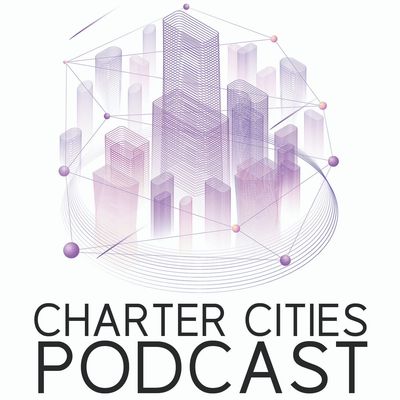The Charter Cities Podcast explores how charter cities can help solve some of the largest challenges of the 21st century, from urbanization to global poverty to migration. Each episode Mark Lutter interviews experts in international development, new cities, finance, entrepreneurship, and governance, to develop a better understanding of the various aspects of charter cities If you want to learn more visit the Charter Cities Institute at https://www.chartercitiesinstitute.org/
https://www.chartercitiesinstitute.org/
episode 24: The Economics of Climate Change with Matthew E. Khan
Much talk around climate change focuses on mitigation, with far less attention paid to adaptation strategies. Matthew E. Khan, an Economics Professor at Johns Hopkins and Director of the 21st Centuries Cities Initiative, is a climate change adaptation optimist. His research focuses on urban and environmental economics. At the start of the year, he released two books, Unlocking The Potential of Post-Industrial Cities and Adapting to Climate Change. In this episode, Kurtis Lockhart sits down with Matthew to unpack some of the key themes in his books, along with other insights around urban governance and policies. We begin by hearing about the lack of imagination synonymous with climate change adaptation strategies and why policies that focus solely on carbon footprint emissions are misplaced. The mechanisms for each approach are essentially the same, but the buy-in and application are different. Matthew makes the case for adaptation, and we also get into the long-term thinking that this strategy requires. There are economic levers that can be used to deal with climate change which have a longer timeline. However, they are under-utilized, resulting in little to no sustained change. Matthew also talks about the value of competition and how it can make cities more efficient. Our wide-reaching conversation also touches on the place-based policies, the use of big data and how it can be leveraged to help people make decisions about where to live, why the poor have to be prioritized when it comes to climate change policies, and the importance of experimentation before policies are enacted. This was an insightful discussion, that touched on a range of timely topics, which continue to become more urgent as time goes on. Be sure to tune in to hear more!
Key Points From This Episode:
• Matthew’s insights into what happened with the Texas freeze.
• The role that private actors have to play in dealing with climate change-related problems.
• How Matthew and Bill Gates’ book differ and what Matthew would say to Bill if he was given a chance to engage with him.
• There is a lot of optimism about carbon footprint reduction, but pessimism about adaptation.
• How quality of life in a city attracts top talents and large companies.
• Why short-sightedness about an issue like climate change is an urban economics issue.
• Why issuing majors parcels of land during their tenure will inspire long-term thinking.
• How the lack of competition between cities in the U.S. contributes to inefficiencies.
• The importance of competition in creating more liveable cities.
• What Matthew’s work in China revealed about state-owned entities.
• Why placed-based policies work well in China but not in the U.S.
• The benefits of creating hubs around universities and the place-based policies that can follow.
• The poor face the greatest challenges in cities in terms of access, and resilience to climate change.
• The tension that comes with moving poorer people to so-called ‘good neighborhoods’ despite empirical evidence that shows better outcomes.
• Use of economic incentives during refugee crises.
• Benefits of using charter cities as ways to deal with climate change refugees.
• The biggest challenges that come with rezoning land in cities; the coordination failure.
• Matthew’s take on The Wire and the good and bad it did for the reputation of Baltimore.
• Adapting to climate change will not be a problem for the wealthy; the poor will suffer.
• Will the value of land in favelas in Brazil increase as sea levels rise?
• What excites Matthew most about the big data revolution and an example of an interesting big data application.
• Big data and access to information will help people make better decisions.
• Voters can make better decisions when they have better information about candidates.
• Why climate change adaptation measures, like carbon taxes, cannot be applied universally.
• The reason that we are not seeing congestion pricing implemented around the world.
• Why Matthew is a proponent for decentralization; it allows for experimentation.
• Insights into the work that Matthew’s consulting firm does.
Links Mentioned in Today’s Episode:
Charter Cities Institute
Charter Cities Institute on Facebook
Charter Cities Institute on Twitter
Kurtis Lockhart
Matthew E Khan on Twitter
21st Century Cities Initiative
Unlocking the Potential of Post-Industrial Cities
Adapting to Climate Change
How to Avoid a Climate Disaster
Alexandria Ocasio-Cortez
First Street Foundation
Mayor Bill de Blasio
The University of Chicago
David Ricardo
Donald Bren
'Why Do The Poor Live In Cities?'
'The birth of edge cities in China'
An Analysis of Nevada's Proposed Innovation Zones Law
Jump-Starting America
Johns Hopkins University
The New Geography of Jobs
'The Effects of Exposure to Better Neighborhoods on Children'
Stefanie A. DeLuca
The Heckman Equation
Raj Chetty
The Wire
Hernando de Soto
Milton Friedman
'Heat and Learning'
Andrew Yang
Siqi Zheng
